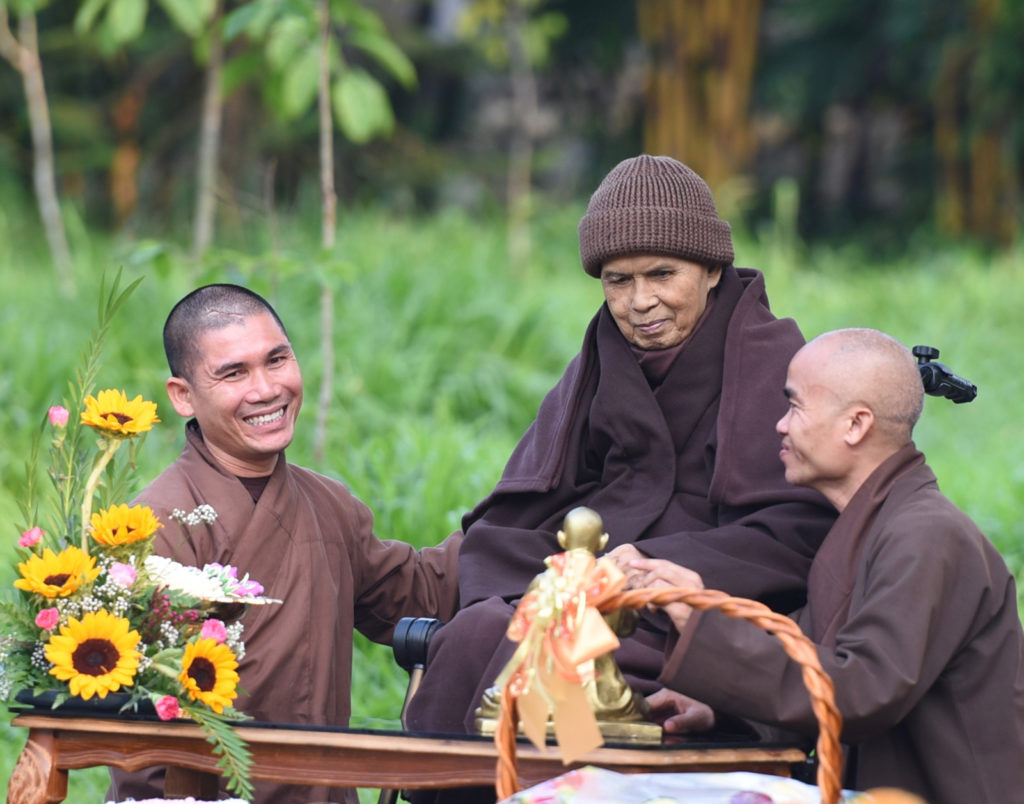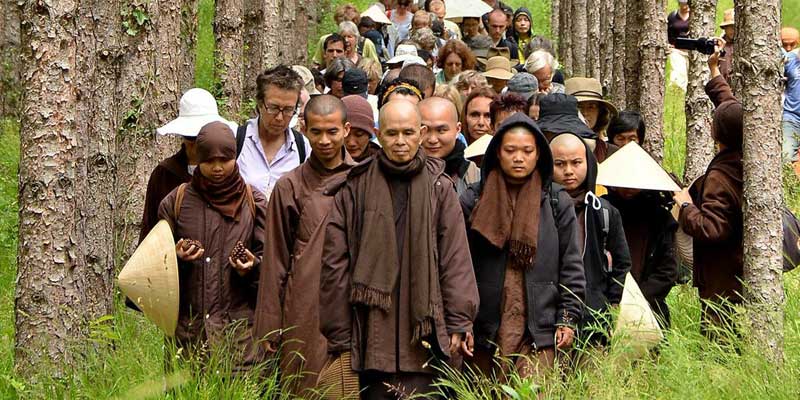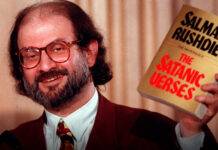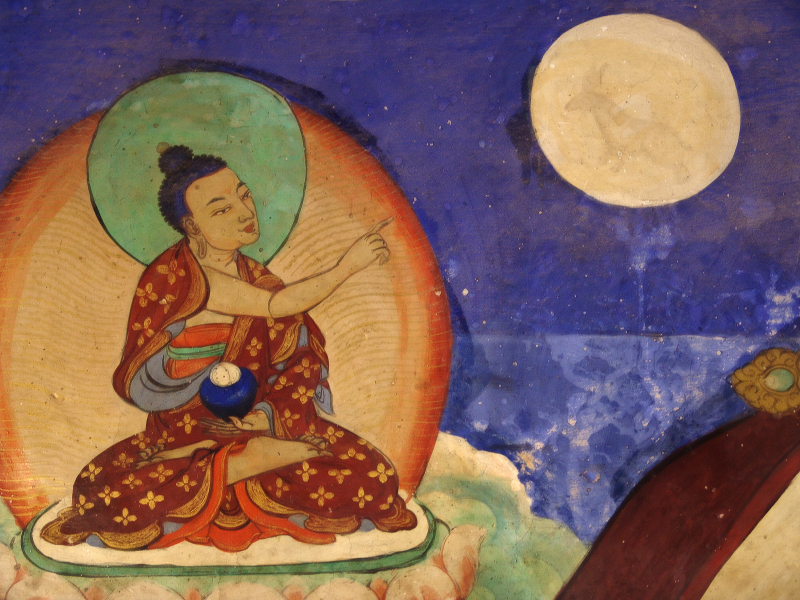There is no phenomenon in the universe that does not immediately concern us, from a peeble resting at the bottom of the ocean, to the movement of a galaxy millions of light years away. The poet Walt Whitman said,” I believe a leaf of grass is no less than the journey-work of the stars…” These words are not philosophy. They come from the depths of soul. He said, ” I am large, I contain multitudes” – Thich Nhat Hanh
There are moments when I feel tired of the never-ending flow of ‘breaking news’–the stories of politics and elections, strategies and manifestos, corruption and scandals, and celebrities and lifestyles. I begin to long for something deep–something beyond this intoxication with the temporality of power and fame, money and sex, and politics and pleasure. Possibly, because of the mystery of the invisible force, my prayers were heard. And believe me, this time I found yet another piece of news: Thich Nhat Hanh–the ailing 92-year old Buddhist monk– has finally returned home to Vietnam to enjoy the rest of his life. Yes, he has returned to a Buddhist temple; devotees from many parts of the world are coming to see him; in a way, with absolute mindfulness the monk is preparing to die.
I lose my voice. I remain silent. I have read his books. His words have touched my soul. And now when with absolute grace he is preparing to die, something happens to me. I ask myself: How is it possible? The fear of death haunts us; and as modern medicine seeks to conquer death, we become more possessive of this embodied existence. We do not orient ourselves to die; instead, with a medically monitored body we seek to hide from the ultimate reality: everything that is phenomenal is bound to wither away. In fact, we are trained to postpone death. We normalize the taboo on death.
However, as we think and feel deeply, we realize that there is the eternity of sunrise and sunset: the way old leaves fall from the tree, and new leaves come. And the amazing sunset or the rhythmic dance of an old leaf falling from the tree reminds us that life means death, and death means life; and maturity or wisdom means the acknowledgement of this fundamental truth. Only then, as Thich Nhat Hanh says,is it possible to rise above birth and death, and to know how to live and how to die.
Yet, it is difficult for us. Our attachment to all that is temporal causes fear, pain and violence. Moreover, we begin to fragment time; we measure and quantify it. See its consequences. The trauma of the ‘past’ disturbs the present moment; and the urge to secure a hypothetical ‘future’ makes it difficult for us to live in the moment. Yes, we are in a hurry. We postpone the intensity of life–here and now– for an imaginary future. We fear death precisely because we do not live meaningfully, and keep thinking that one fine morning we will begin to love, sing, dance and meditate. As it never comes, our repressed selves are filled with fear and anxiety. And it further insulates us. We beccme disconnected.
The monk lived differently. And hence, his wisdom is so amazing. What did he try to convey to us?
This Moment is Eternal
“Walking meditation is really to enjoy the walking–walking not in order to arrive, just for walking….We walk all the time, but usually it is more like running. Our hurried steps print anxiety and sorrow on the Earth. If we can take one step in peace, we can take two, three, four, and then five steps for the peace and happiness of humankind. – Thich Nhat Hnah
I often ask myself: Why is it difficult for me to merge completely with what I do? Yes, at this very moment I am writing this piece. But then, can this very act of writing at this moment be a meditative act with absolute mindfulness? Or is it that I am thinking of something else while writing this piece–say, where to publish it, or whether it would be liked by the readers, or whether I should do it fast because I have to see a film and attend a party? Quite often, because of the ceaseless flow of thoughts, we miss the moment. We fail to live in the present with absolute mindfulness. Instead, with a restless mind we become more and more alienated from what we do. Is it what is happening to me?
At this juncture,Thich Nhat Hanh seeks to awaken us; he tells a different story. Listen to it:
When I sit here, I don’t think of anything else. I sit here, and I know where I am. I know this is a wonderful moment. It is a joy to sit, stable and at ease, and return to ourselves–our breathing, our half smile, our true nature. We can appreciate these moments. We can ask ourselves,’If I do not have peace and joy right now, when will I have peace and joy–tomorrow or after tomorrow? What is preventing me from being happy right now?’ When we follow our breathing, we can say ‘calming, smiling, present moment, wonderful moment’.
Yes, the complete merger with the present moment is the moment of meditation. It is like living life intensely, deeply and meaningfully. This merger, I would imagine, is the experience of the divine. This is bliss. When I walk I walk; when I take tea I take tea; when I see the landscape I see the landscape. No wonder, for the monk, what appears to be ordinary becomes extraordinary. Even drinking a cup of tea is meditation, provided you do not allow anything else to come between you and the tea. ‘When we are able to truly meet the tea, at that very moment’, says Thich Nhat Hanh, ‘life is’. Indeed, drinking tea becomes the most important thing in life at that moment. Yes, it is the ‘practice of mindfulness’.
When every moment is a moment of awakening, one experiences eternity in that moment itself. One doesn’t postpone it for an imaginary future. And hence there is no fear–fear of tomorrow, fear of death. There is no need for holding or possessing. In fact, even the moment of death becomes a practice of ‘mindfulness’. The meditative self observes the act of withering away. No wonder, the Biddhist monk could do it. He doesn’t fear death. He is ready to welcome it as it comes–the way, he washes the dishes with absolute awareness of the water, and each movement of his hands.

For a Meditation on Interdependence
Watching a green caterpillar on a leaf, we understand the importance of the caterpillar, not just from our self-centered point of view as a human, but from the penetration based on the interdependence of all things. Realizing the preciousness of the life of every being, we dare not to deprive the caterpillar of its life. If some day we have to kill a caterpillar, we will feel as if we are killing ourselves, that something of ourselves dies with the caterpillar. – Thich Nhat Hanh
Why is it that we seek to possess and dominate? Is it because of our inflated ‘egos’–our ignorance, our inability to see and realize that nothing can be seen in isolation, and everything is interconnected? Not to experience this connectedness is to live with the burden of one’s ‘ego’; and it invariably causes fear and violence. However, ‘when we deeply penetrate the principle of interdependence, as Thich Nhat Hanh writes,’ we see that this sense of separateness is false.’
Let me reflect on the meditation on interdependence. I look at the sun, and ask myself whether my existence can be separated from the sun. If the sun stops shining, the flow of my life will stop. Is it the reason why Thich Nhat Hanh says that ‘the sun is our second heart, our heart outside of our body?’ Indeed, every object is composed of and contains all others. Yes, one is all; all is one.
Yet, the realization of this interdependence–say,’ the unity of a speck of dust, a flower and a human being’– becomes difficult because we love to fragment, divide and separate. Technology intensifies our collective narcissism; we love to control and dominate nature. Capitalism transforms us into greedy consumers. With the individualistic urge to possess and consume we bcome instrumental and strategic; we become warriors. Is it the reason that we find ourselves in a world devoid of love and compassion?
However, it is the meditation on interdependence that can generate love and compassion. To quote Thich Nhat Hanh,
The interdependence of all beings is not a philosophical game removed from spiritual and practical life. In bringing to light the interdependence of all phenomena, the meditator comes to see that the lives of all beings are one, and he or she is overcome with compassion for all.
Yes, Thich Nhat Hanh –you lived intensely; you are the embodiment of mindfulness; and with the constant meditation on interdependence you radiated love and compassion. Love eliminates the fear of separation. No wonder, the idea of death does not frighten you; death, you know, is inseparable from life. With absolute grace you are welcoming it.
In a culture that normalizes fear and violence, what else can be more refreshing than your wisdom–your Buddhist art of living and dying?














